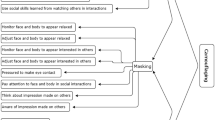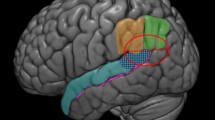Abstract
Difficulties in social interaction are a central feature of Asperger syndrome. Effective social interaction involves the ability to solve interpersonal problems as and when they occur. Here we examined social problem-solving in a group of adults with Asperger syndrome and control group matched for age, gender and IQ. We also assessed autobiographical memory, on a cueing task and during social problem-solving, and examined the relationship between access to specific past experiences and social problem-solving ability. Results demonstrated a social problem-solving impairment in the Asperger group. Their solutions were less detailed, less effective and less extended in time. Autobiographical memory performance was also impaired with significantly longer latencies to retrieve specific memories and fewer specific memories retrieved in comparison to controls.
Similar content being viewed by others
Notes
Further education colleges in the UK provide training in practical/technical pursuits, although some academic courses are offered these are frequently attended by students who do not make it to University.
References
Blair, R. J. R., Frith, U., Smith, N., Abell, F., & Cipolotti, L. (2002). Fractionation of visual memory: agency detection and its impairment in autism. Neuropsychologia, 40(1), 108–118.
Blacher, J., Kraemer, B., & Schalow, M. (2003). Asperger syndrome and high functioning autism: research concerns and emerging foci. Current Opinion in Psychiatry, 16(5), 535–542.
Boucher, J., & Lewis, V. (1989). Memory impairments and communication in relatively able autistic children. Journal of Child Psychology and Psychiatry, 30(1), 99–122.
Boucher, J. (1999). Time and the implicit–explicit contiuum. Behavoural and Brain Sciences, 22(5), 758–785.
Bowler, D. M. (1992). Theory of mind in Asperger syndrome. Journal of Child Psychology and Psychiatry and Allied Disciplines, 33(5), 877–893.
Bowler, D. M., Gardiner, J. M., & Grice, S. J. (2000). Episodic memory and remembering in adults with Asperger syndrome. Journal of Autism and Developmental Disorders, 30(4), 295–304.
Channon, S., Charman, T., Heap, J., Crawford, S., & Rios, P. (2001). Real-life-type problem-solving in Asperger’s syndrome. Journal of Autism and Developmental Disorders, 31(5), 461–469.
Dunn, L. M., Dunn, L. M., Whetton, C., & Burley, L. (1997). British picture vocabulary scale. (2nd ed.) NFER-Nelson.
Evans, J., Williams, J. M. G., O’Loughlin, S., & Howells, K. (1992). Autobiographical memory and problem-solving strategies of parasuicide patients. Psychological Medicine, 22, 399–405.
Ghaziuddin, M., Ghaziuddin, N., & Greden, J. (2002). Depression in persons with autism: implications for research and clinical care. Journal of Autism and Developmental Disorders, 32(4), 299–306.
Goddard, L., Dritschel, B., & Burton, A. (1996). Role of autobiographical memory in social problem-solving and depression. Journal of Abnormal Psychology, 105, 609–616.
Goddard, L., Dritschel, B., & Burton, A. (1997). Social problem-solving and autobiographical memory in non-clinical depression. British Journal of Clinical Psychology, 36, 449–451.
Gunter, H. L., Ghaziuddin, M., & Ellis, H. D. (2002). Asperger syndrome: Tests of right hemisphere functioning and interhemisphere communication. Journal of Autism and Developmental Disorder, 32(4), 263–281.
Klein, S., Chan, R. L., & Loftus, J. (1999). Independence of episodic and semantic self-knowledge: the case from autism. Social Cognition, 17(4), 413–436.
Kopelman, M., Stanhope, N., & Kingsley, D. (1997). Temporal and spatial context memory in patients with focal frontal temporal lobe and diencephalic lesions. Neuropsychologia, 35(12), 1533–1545.
Kremers, I. P., Spinhoven, P., & Van der Does, A. J. W. (2004). Autobiographical memory in depressed and non-depressed patients with borderline personality disorder. British Journal of Clinical Psychology, 43, 17–29.
Marx, E. M., Williams, J. M. G., & Claridge, G. S. (1992). Depression and social problem-solving. Journal of Abnormal Psychology, 101, 78–86.
Millward, C., Powell, S., Messer, D. & Jordan, R. (2000). Recall for self and other in Autism: Children’s memory for events experienced by themselves and their peers. Journal of Autism and Developmental Disorders, 30(1), 15–28.
Minshew, N. J., & Goldstein, G. (2001). The pattern of impaired memory functions in autism. Journal of Child Psychology and Psychiatry and Allied Disciplines, 42(8), 1095–1101.
Montangero, J., Pons, F., & Cattin, J. (2000). The diachronic approach and solutions to interpersonal conflicts. British Journal of Developmental Psychology, 18, 415–429.
Nelson, K. (1993) The psychological and social origins of autobiographical memory. Psychological Science, 4, 7–14.
O’Connor, M., Butters, N., Miliotis, P., Eslinger, P. & Cermak, L. S. (1992). The dissociation of anterograde and retrograde amnesia in a patient with herpes-encephalitis. Journal of Clinical & Experimental Neuropsychology, 14(2), 159–178.
Ogden, J. A. (1993). Visual object agnosia, prosopagnosia, achromatopsia, loss of visual imagery and autobiographical amnesia following recovery from cortical blindness: case M.H. Neuropsychologia, 31(6), 571–589.
Platt, J. J., & Spivack, G. (1975). Manual for the Means-Ends Problem-Solving Test (MEPS): a measure of interpersonal problem-solving skill. Philadelphia, Hahnemann Medical College and Hospital.
Rogers, T. B., Kuiper, N. A., & Kirker, W. S. (1977). Self-reference and the encoding of personal information. Journal of Personality and Social Psychology, 35, 677–688.
Scott, J., Stanton, B., Garland, A., & Ferrier, I. N. (2000). Cognitive vulnerability in patients with bipolar disorder. Psychological Medicine, 30(2), 467–472.
Suddendorf, T., & Corballis, M. C. (1997). Mental time travel and the evolution of human mind. Genetic, Social and General Psychology Mongraphs, 123(2), 133–167.
Toichi, M., Kamio, Y., Okada, T., Sakihama, M. Youngstrom, E., Findling, R. & Yamomoto, K. (2002). A lack of self-consciousness in autism. American Journal of Psychiatry, 159(8), 1422–1424.
Tulving, E. (1985). Memory and consciousness. Canadian Journal of Psychology, 26, 1–12.
Williams, J. M. G. (1996). Depression and the specificity of autobiographical memory. In D. Rubin (Ed.) Remembering our past: studies in autobiographical memory. Cambridge, Cambridge University Press, pp. 244–267.
Williams, J. M. G. & Dritschel, B. (1992). Categoric and extended autobiographical memories. In M. A. Conway, D. C. Rubin, H. Spinnler, & W. A. Wagenaar (Eds.) Theoretical perspectives on autobiographical memory. Dordrecht Boston and London, Kluwer Academic, pp. 391–412.
Wechsler, D. (1998). Wechsler memory scale (3rd ed). Psychological Corporation:, Harcourt Brace, London.
Wechsler, D. (1999). Wechsler Abbreviated Scale of Intelligence. Psychological Corporation: London.
Wheeler, M. A., Stuss, D. T., & Tulving, E. (1997). Towards a theory of episodic memory: the frontal lobes and autonoetic consciousness. Psychological Bulletin, 121(3), 331–354.
Acknowledgments
This research was supported by funding from the Economic and Social Research Council (UK), Ref. RES-000-22-0008. We are very grateful to all who participated in the study.
Author information
Authors and Affiliations
Corresponding author
Appendix
Appendix
Means-End Problem-Solving Task Additional Scoring Procedure
Perspective Taking
A 3 point scale was devised where 0 denoted no reference within the solution to another’s perspective. A score of 1 was given where there was at least some implicit appreciation of another’s view. For example, to apologise would infer some regard for another’s viewpoint. A score of 2 was given where a more explicit understanding of another’s position was given, for example where participants advocated the need to discuss issues and compromise or try to understand how another is feeling.
References to Cognitons
A score of 1 (as opposed to 0) was given where there was a reference to the need for cognition e.g., “try to work out what he’d done wrong”.
Time Appreciation
A score of 0 was given if the solution offered implied an instant response with no time course, e.g., “He should give her some flowers and apologise”. A score of 1 was given where the solution implied some sequencing which extended over time., e.g., “John should approach his friend one-by-one to ask them why they are avoiding him”. A score of 2 was given where there was explicit mention of time required for effective problem-solving, e.g., “He should wait for a while to check that he’s not just being paranoid, then if they keep on ignoring him, approach them and ask what’s wrong’’.
Script Violation
This measure was treated very conservatively with a script violation only having deemed to occur when the solution did not resemble any other solution generated by any other participant. An edited example of a script violation (in response to being avoided by friends) is given below:
First he was wearing black shoes and the next day white shoes with stars. Friends made excuses to ignore him ‘sorry can’t talk’...He went to classroom teacher..Was confused why, they said have you changed anything about yourself, he said “no just my shoes with stars on’’. Teacher said you think about what you have just changed and he says, yes it’s probably the shoes with stars on...changed his shoes and friends stopped avoiding him.
References to Emotions
These measures recorded the incidence of emotion e.g., “after he left, she sat down and cried”
Rights and permissions
About this article
Cite this article
Goddard, L., Howlin, P., Dritschel, B. et al. Autobiographical Memory and Social Problem-solving in Asperger Syndrome. J Autism Dev Disord 37, 291–300 (2007). https://doi.org/10.1007/s10803-006-0168-0
Published:
Issue Date:
DOI: https://doi.org/10.1007/s10803-006-0168-0




